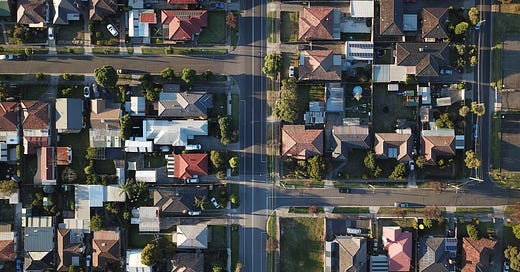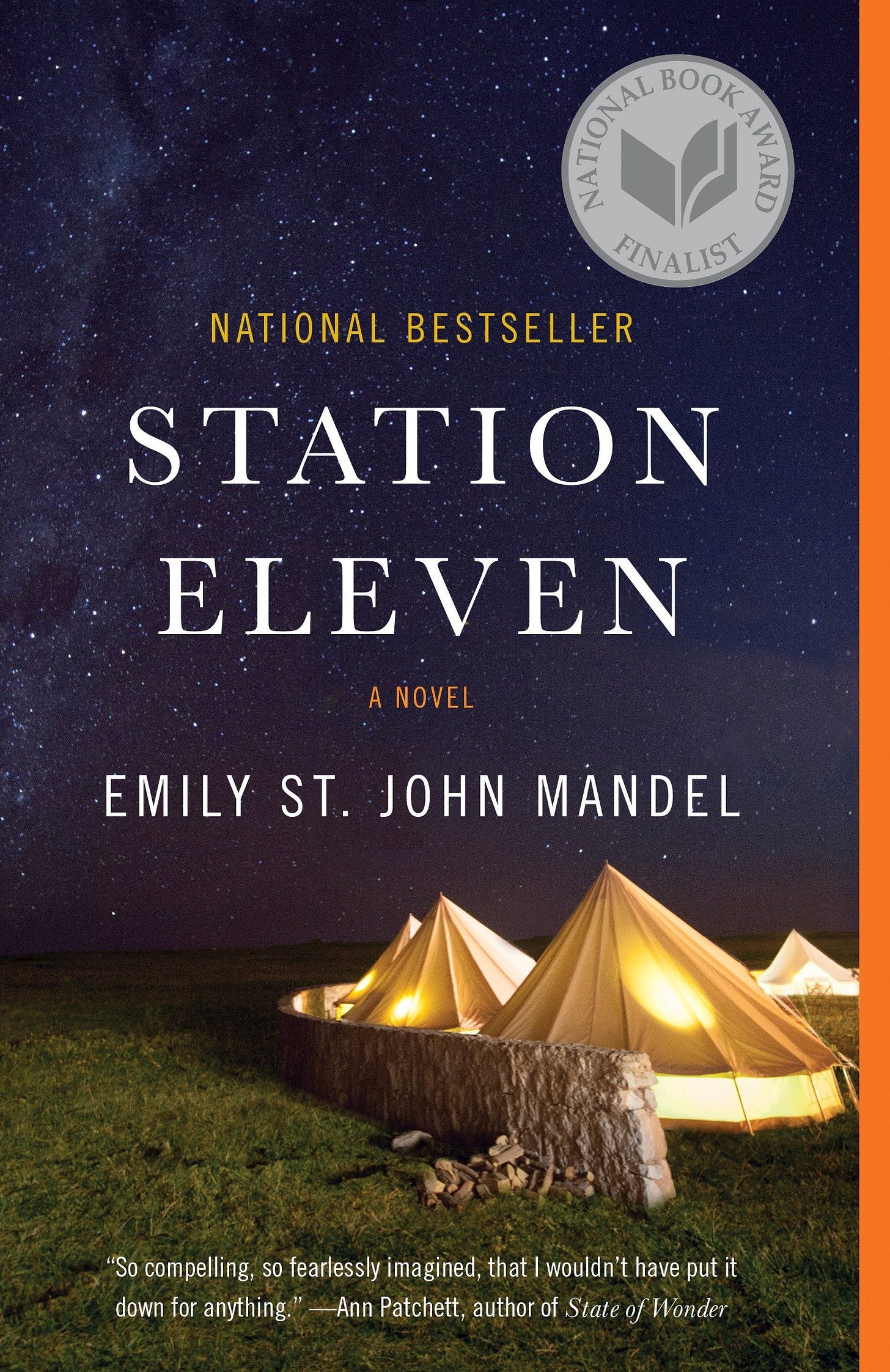
Discover more from Writing from Kate & Ali
Dear Kate,
Last week, I wrote a letter about the difficulty of being together.
This week, I wanted to do some thinking about why that might be. I looked around at my neighborhood, my house, my day-to-day life, and I tried to notice all the little ways our modern world has been built for isolation and convenience rather than community. In so many ways, the things designed to “make our lives easier” come with short-term benefits and long-term consequences, indulging a silly conception of self-reliance and keeping us cozy in isolation without the necessity of community (or the sacrifices community requires.) Long before the pandemic, technology was teaching us how to live alone.
That’s worth noticing. We might not recognize it within the daily work of keeping our heads above water — answering emails, reading the news, washing dishes, checking Slack — but if we step back a bit, we can see that technology (broadly defined) has facilitated an unprecedented shift in the way we relate to one another.
For centuries, human life centered around a rhythm of commitments: The planting and harvesting of grain, the weekly liturgy at church, the rituals of weddings, births, baptisms, and funerals. Those commitments, practiced day after day, season after season, decade after decade, created binding relationships with other people, a sense of civic engagement, and a sense of individual personal responsibility. Lives were intertwined. People had to rely on each other in ways large and small: Borrowing a cup of sugar, sharing provisions in the winter, keeping an eye out for someone else’s children playing in the street. Together, in a community, responsibility and commitment offered purpose.
In the twenty-first century, technology evolved to empower the individual. We set out to move beyond responsibility, to pursue higher-order desires: choice, freedom, and convenience. The question was no longer, “What do I need?” but instead, “What do I want?” Modernity brought many luxuries: plane travel, television, the ability to enjoy fresh produce regardless of seasonality, penicillin. Yet it also brought an onslaught of loneliness. Responsibility is a communal endeavor—you must be responsible to someone else. Freedom, by contrast, can only be pursued alone.
How did this shift from the communal to the individual happen? What does it look like in our daily lives today? Let’s look at 10 examples of how technology can keep us apart.
Headphones: Historically, music was a communal activity. Italian operas, Mozart symphonies, and church choirs were always heard in a group. Record players and radios brought music into private spaces, but there were still other people around listening — neighbors next door, friends riding shotgun in the car. Headphones allowed us to experience music fully alone. Headphones gave us the sense that the music was made just for us, a soundtrack to our particular, specific lives; part of a movie in which we’re the main character. Headphones are also an incredible tool to keep people out, a barrier between you and chatty strangers. How much community have we lost with plastic in our ears?
Leaf blowers: Margaret Renkle recently pointed out that leaf blowers contribute massive noise pollution to America’s quietest places: Suburbs, parks, and recreation areas. Industrialization — switching from metal rakes to deisel leaf blowers — made the job easier, but at what cost? Quiet, once a common good, is now a luxury good. If our public places are less quiet, how much less often do we frequent them? How often do we stay home, within our silent walls, instead? How much community have we lost without the ability to ask, “Did you hear that birdsong?”
Television: Consider the emotions you feel watching cable news versus holding a physical newspaper. One is in your face, the other feels removed. One is linearly delivered into your eyes and ears, the other can be quietly scanned and considered, then put down. How much community have we lost without distance between events and our emotions?
Labor-on-Demand: Services like Angie’s List, Thumbtack, and TaskRabbit make it easy to hire someone to fix household problems. Care.com makes it easy to find a babysitter, Rover.com makes it easy to find a dog walker. In tricky situations when we used to rely on someone nearby — a neighbor to help with a leaky pipe, a local teenager to walk the dog — we can now hire someone to solve our problems instantaneously. We can pretend they’re magic robots, machines slipping into our homes to leave it tidy and new. No chit-chat, no recurring interactions, no problem. We don’t even have to learn their names. How much community do we lose when odd jobs are solved with a tap?
Airbnb: Did your parents used to have a section in the linen closet reserved for “guest sheets?” Mine did. It was assumed that anyone — a friend, a family member — might call the house with a request to stay over. You never know who might be driving through town. Now, Airbnb is so frictionless, we don’t trouble anyone with “houseguests.” We’d rather book a room than be a bother. How much community do we lose when we all stay out of one another’s way?
Uber: Needing a ride to the airport is the plot for at least three Seinfeld episodes. It’s such a strong mechanism for friendship. A ride to the airport is a favor that can be offered, taken, and returned again and again. It provides quiet time in the car, pleasant chit-chat about the trip, the possibility of picking up a snack on the way home. Now, that’s all but gone. Uber is too cheap, and too easy. How much community do we lose when we don’t offer free rides?
E-commerce: We never borrow things anymore. Need a cup of sugar? Just order it from Amazon. Need a lawnmower? Buy one. Need a book? Don’t go to the library, buy it. The sharing and borrowing of items — pots, pans, cookie sheets, chainsaws, sweaters — keeps people together. Individual consumption holds us apart. It’s faster and easier to meet our needs by ordering things online. As Ivan Illich put it, unfettered consumption means “there will be a further increase of useful things for useless people.” How much community do we lose when we all own our own cookie sheet?
Google Maps: We never get lost anymore! So many adventure movies are based on the premise of getting lost. Think of all the friendships, mishaps, and tall tales we’ve missed out on by never being able to get lost. How much community do we lose when we never have to stop and ask for directions?
Texting: Most of us maintain our friendships through texting. What if we owed each other more than that? One law of economics is that price is the best indication of value. We all know the price of texting is low: It’s cheap and quick. Therefore, its value feels low. A “congratulations!” text may as well have never been sent. But what if we communicated through mediums that were more expensive, that took more of our time? Hand-written letters, phone calls, walks through the neighborhood? Value could be given, and given again. How much community have we lost through cheap communication?
Glass: The advent of clear glass during the Roman Empire allowed us to see in unprecedented ways: We could see our reflection in mirrors, we could see light through windows. Without glass, our best hope was to peer at ourselves in ponds, to stare dimly in the corners of hovels. Glass led to telescopes and microscopes, eyeglasses and skyscrapers. Suddenly, we could see things large and small. Who knew that today, something as simple as glass would define our lives — the black glass of iPhone screens, the illuminated glass of TVs, the glass of fiber optic cables delivering internet to our homes. How much community have we lost to our own reflection?
In pursuit of ease and comfort, technology has drawn us deeper into ourselves and further from one another. Still, the writer L.M. Sacasas points out how a technology as simple as a dinner table can bring us together.
“The table gathers and separates and creates a setting for conversation, for fellowship,” he explains. “That’s been so fundamental to human experience. Food and sociability have been a centerpiece of human cultures throughout recorded history and beyond.” Gathered around a table, we can remember how to be with one another once again.
What tables are you sitting at this week? Hopefully we can share a meal over a common table together again soon.
XOXOX,
Ali Montag
My Book Rec: Station Eleven
My book rec: Station Eleven by Emily St. John Mandel
Why you should read it: I have not yet started this book, but it is cheerfully waiting for me on my shelf. I loved The Glass Hotel, it was so quick and alluring. Also, this interview with Emily St. John Mandel is great. I love the energy of this quote:
“I often put books down without finishing them. Unless you’re reading for research and need to just power through to absorb information, I think it’s possible that life’s too short to spend time with books that you don’t love.”
Subscribe to Writing from Kate & Ali
Links & excerpts from two writer friends, Kate Lucky & Ali Montag.







Headphones are one of my pet peeves. You see all kinds of people in public, athletes on TV and others that are totally missing out on life because they are blocking our their surrounding. You would think an athlete getting ready to play in a big game would like to experience all the pomp surrounding the event and not block it out. That's how memories are made.
The ten examples really make you stop and think. I'm also fascinated by similar impacts with architectural trends in housing, especially in just the past 50 or so years. Several items from your list made me think of a book I recently added to my to-read list: The Outsourced Self by Arlie Russell Hochschild. This week's post might move that book up the list. Thanks for sharing each week!